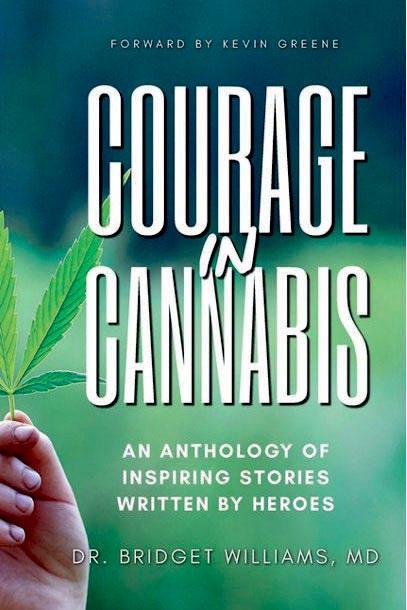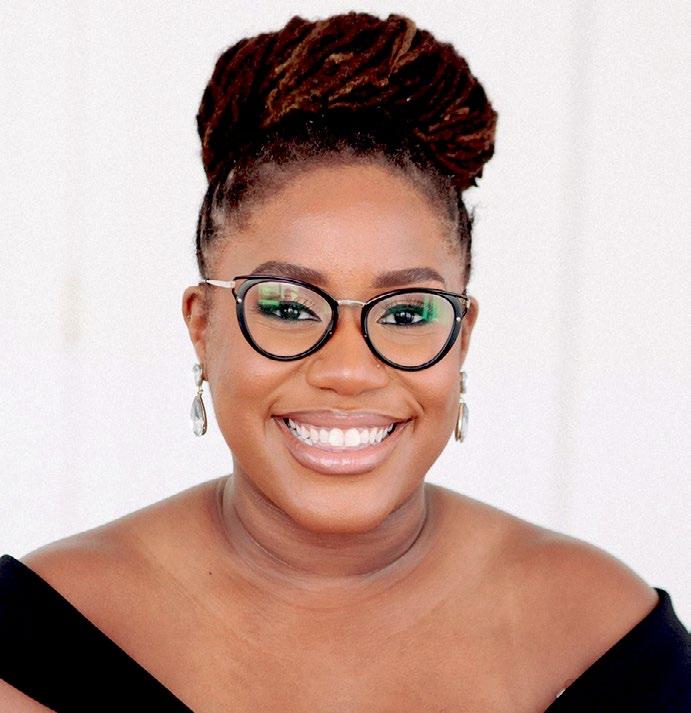
12 minute read
Feature
FEATURE Building Community - One Black Business At A Time
BY DAWN A. DAVIS
Advertisement
Abygail, Alexandria, and Ashleigh Montague are not just sisters. They are young Jamaican Canadian entrepreneurs paving successful paths for black-owned businesses in the Greater Hamilton Ontario area of Canada.
Ashley, 29, Alexandria, 23-, and 18-year-old Abygail founded BLK OWNED, a non-profit support organization, in 2020, to help sustain and encourage black-owned businesses, and subsequently BMRKT, their for-profit social enterprise setup to help BIPOC (Black Indigenous & People of Color) business owners showcase and sell their products through open markets, gaining a wider customer base.
The impetus for all of this began as a response to George Floyd’s killing in 2020. They wanted to do more than just show their support online for Black Lives Matter. The sisters decided to patronize black businesses within their community, but quickly realized they knew only a few.
“We saw that there was a need and so we started building a list of black owned businesses within the greater Hamilton region,” explained Jamaicanborn Ashleigh Montague in a conversation with Caribbean Today.
“Collectively with some community members, we generated a list of over 150 businesses within this area. And so, from that day we started to celebrate, showcase, explore, and support black businesses in the greater Hamilton area. We initially started showcasing them online through our Instagram platform,” Montague continued.
ENLIGHTENING
Determined to take the challenge further, they formalized BLK OWNED and did the necessary work.
They applied for funding to conduct a feasibility study so the gaps could be identified. Through funding from the Canadian government’s Investment Readiness Programme, the Montagues worked with consultants who helped them carry out the study and run focus groups. Their findings were enlightening.
“We deduced that business owners within our city and the region are young. In fact, 42% of those who responded to our survey were between the ages of 30 to 45. And 40% were between the ages of 17 to 29,” said Ashleigh Montague. “The next thing we saw was that quite significantly, a lot of them were earning under $10,000. Yet still 80% of them were saying they wanted to leave a legacy behind through their businesses, So there’s a gap. How can you be creating sustainable businesses but not generating sustainable revenue?.”
To bridge that gap, the sisters created programs and workshops to provide the resources and tools lacking amongst the black-owned businesses in their community. Focusing on marketing, customer service, building customer base, networking, and financial literacy, BLK OWNED became the catalyst helping many of these businesses grow.
Montague elaborated: “Our Trailblazer programme is focused on black youth entrepreneurs. And youth for us is ages 18 to 39 because it’s not about the age but the stage of your business. Through this program, they have access to two mandatory sessions, which is an eight-hour day boot camp. And we have different facilitators who drop in to talk about your business model, setting up the structure of your business for growth. We’ve also paired that with mentorship opportunities.”
RELATIONSHIPS
Working in collaboration with the Black Business Professional Association of Canada through their Black African and Caribbean Entrepreneurship Leadership initiative, BLK OWNED has enhanced their business and life skills training programs for the businesses they support.
For these young entrepreneurs it’s not just about owning a business, it’s about building and supporting their community. Yes, it is hard work said Montague, mentioning sourcing enough financial support to continue the work they are doing. However, working with the community makes it all worth it.
“The most rewarding thing for us are the relationships that we’re building within the community and seeing the impact that we’re making through BLK OWNED and BMRKT on these business owners,” said Montague.
The young business owner added that she and her sisters have always been influenced by their Jamaican heritage.
“We always say that our parents have been the ones to instill community in us. In Hamilton we have something called the Jamaica foundation, a community organization that brings us back to our roots,” added Montague. “They host events, fundraisers, they do different activities for the community. And since I was in elementary school these were things that I was a part of. It’s what brings us joy, and I’m so grateful for that. It’s a rooted value in both our businesses today, in BLK OWNED and BMRKT.”
Ashleigh Montague and her sisters, Alexandria and Abygail, young Jamaican Canadian entrepreneurs, founded BLK OWNED, a non-profit support organization, in 2020, to help sustain and encourage black-owned businesses in Canada. (Contributed image)
Y
Days after the slapping incident at the 2020 Academy Awards on March 27, 2022, a Member of Parliament in the Caribbean islands of St. Vincent and the Grenadines threatened to give a government minister “a Chris Rock special.”
West Kingstown, SVG MP, Daniel Cummings, told Minister of the Public Service, Frederick Stephenson, that he would have gotten a “Chris Rock special” were they near each other.
Cummings was debating a resolution, COVID-19 (Miscellaneous Amendments) Order 2021, (No.32 Of 2021)” when the exchange occurred.
“On this side of the house, one of the portfolios I shadow is health. And, therefore, I
have been on the forefront of discussing matters relating to COVID from this side,” Cummings said.
But Stephenson interrupted with the comment: “from overseas.”
Cummings retorted: “Madam Speaker, I charge you to advise the honorable minister who makes these cynical comments about my medical attention to resist being asinine in his comments because that is what he’s doing. You do not make snide remarks about people’s medical needs.”
Stephenson responded: “I never mentioned your medical needs.”
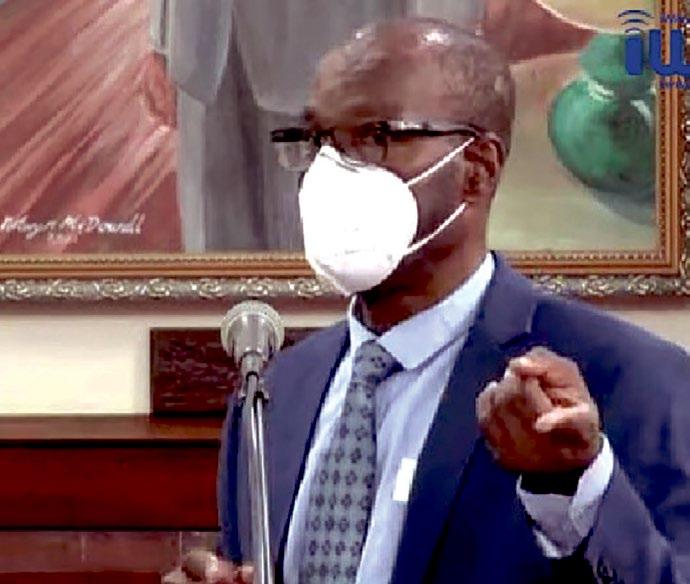
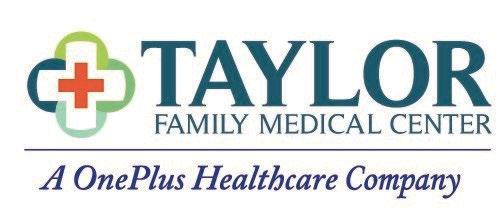
WELCOME TO OUR NEW LOCATION
ACCEPTING NEW PATIENTS FOR ALL MEDICARE ADVANTAGE, AND COMMERCIAL INSURANCE PLANS
Washington Square 111 NW 183rd Street Suite 204 Miami Gardens, FL 33169


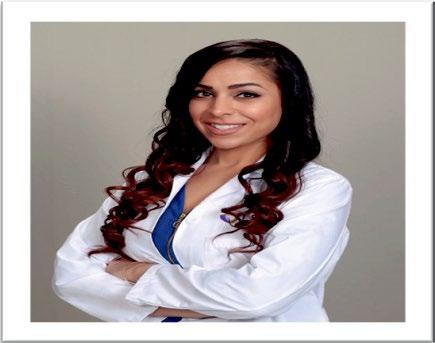
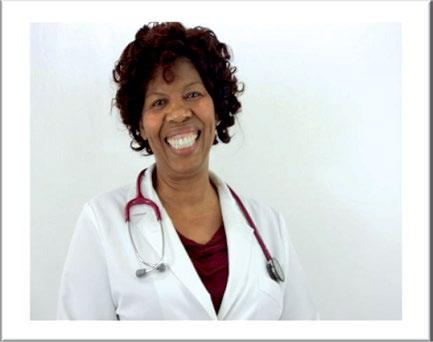

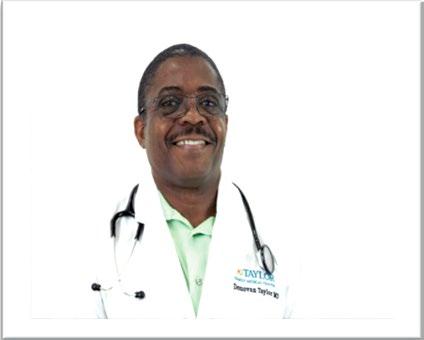
Offi ffice Hours Monday – Friday 8:00 am- 5:00 pm
Office: 305-655-0702 Fax: 305-655-0845 West Kingstown, SVG MP, Daniel Cummings, threatened Minister of the Public Service, Frederick Stephenson, in Parliament, with a “Chris Rock special.” (CMC image)
Courage In Cannabis
BY DAWN A. DAVIS
Long the criminalized ‘sibling’ among the thousands of beneficial natural herbs growing in the United States and globally, cannabis sativa has been struggling for recognition of its valuable properties for generations.
Classed as a Schedule 1 substance under the Controlled Substances Act of 1970, cannabis had essentially been illegal since 1937 with the passage of the Marihuana Tax Act. But today, this maligned herb is being embraced for its positive effects in alleviating the deleterious effects of cancer treatment, controlling seizures, anxiety, and so much more.
Indeed, there are many stories to tell, and that is where Ohio-based Dr. Bridget Williams comes in. A family physician, 18-year practitioner at the Cleveland Clinic, and owner of Green Harvest Health, a medical Cannabis Clinic, Dr. Williams saw, heard, and experienced the stories of those being helped by cannabis.
This moved her to publish book, ‘Courage in Cannabis,’ a compilation of stories from whose who survived their illnesses or conditions with the help of cannabis. The book inspires with its compelling honesty.
“When I decided that I wanted to go into a more alternative space, that first year when I was meeting patients, if they had used cannabis prior, they had been using it illegally,” Dr. Williams told Caribbean Today recently. “So, when I was giving them their medical cannabis, card there was a lot of emotion. I had grown men with tears at times because they had dealt with shame and guilt, and they no longer had to hide their cannabis use from their children. I had women who were fearful of getting more involved with the church for fear of being found out. So, the card really liberated a number of people. Those stories really drew me in. … I feel like it is something that needs to be documented.”
So, she brought together patients, doctors, lawyers, caregivers, educators, activists, entrepreneurs, who shared how cannabis changed their lives.
WORKHORSE
As a doctor, Williams has always been focused on evidence-based medicine, and it is no different when it comes to cannabis.
“CBD and THC are phytocannabinoids that you find in the cannabis plant,” she explained. “But (they) are also found in many other plants.
However, in cannabis they are more concentrated, and so it’s easier to harvest and utilize them. CBD, I really consider the workhorse of cannabinoid medicine. It helps regulate and balance the Endocannabinoid System, (ECS), which oversees every organ, every aspect of our body, the umbrella system that balances.”
In fact, more in-depth studies on the ECS can be found on sites such as the National Institutes of health or Harvard Medical School.
Dr. Wiliams added that there are more than 100 other cannabinoids, but CBD (cannabidiol) and THC (tetrahydrocannabinol) are the two that get the most attention right now.
Underscoring that point, Jamaican-born Kevin Greene, Chief Operating Officer of the Cleveland School of Cannabis, (CSC), who also shared his own story in the foreword to the book, pointed out that: “Everything we need to heal, to be well, grows on the earth and will always be here. So, cannabis is just another natural product that has healing properties.”
He added: “But, we shouldn’t stop at CBD. We should think about all these cannabinoids, all these roots, all these herbs, and how do we start to bring them in our lives in a natural way to reap our wellness.”
Greene established the school in 2017 with a mission to foster adult learning through high-quality, residential and online education that integrates personal development along with career-oriented skills and knowledge related to cannabis, science, and business, to prepare graduates for entry-level employment in the industry. With more and more states legalizing medical use and some recreational use, Greene saw opportunities opening up.
“We believed that there was going to be a huge gap in the workforce. So we developed a workforce development program, a six to eight-month course that allows individuals to be able to get their competencies in the major areas of the industry,” Greene explained CSC’s programs include cannabis cultivation, dispensary operations, hemp and CBD extractions, and a research study class which explores the endocannabinoid system. In fact, it is this focus on education that that drives Greene and Williams to change the way Cannabis is viewed. “I think Courage in Cannabis is a great example of what we do at the school,” he told CT. “Create an epicenter for people to have courage and critical cconversations around this plant and being able to be with likeminded people to get the support that they need and the education they need so they can be successful. We’re celebrating five years and we have graduated over 700 students and put over 70% of those into the industry.”
So, what does the future for cannabis look like in the United States?
Dr. Williams noted that the government already owns a patent on a CBD medication, Epidiolex used to treat seizure disorders. And the US Food and Drug Administration’s website confirmed on June 25, 2018, that it “approved Epidiolex (cannabidiol) [CBD] oral solution for the treatment of seizures associated with two rare and severe forms of epilepsy, Lennox-Gastaut syndrome and Dravet syndrome, in patients two years of age and older.”
This is the first FDAapproved drug that contains a purified drug substance derived from marijuana.
Meanwhile, The U.S. House of Representatives plans to vote on a bill to federally legalize marijuana for the second time in history. The body will take up the Marijuana Opportunity, Reinvestment and Expungement, (MORE) Act, which could remove cannabis from the list of federally controlled substances. And the US Senate passed a bill to cut red tape around the research process of marijuana and marijuana-derived medications. This will help get FDA-approved, marijuanaderived medications safety to patients.
So, the future for cannabis is encouraging. But both Greene and Dr. Williams agree that it all comes down to how do we empower ourselves.
The voices in Courage in Cannabis are doing just that, taking back their right to natural wellness.
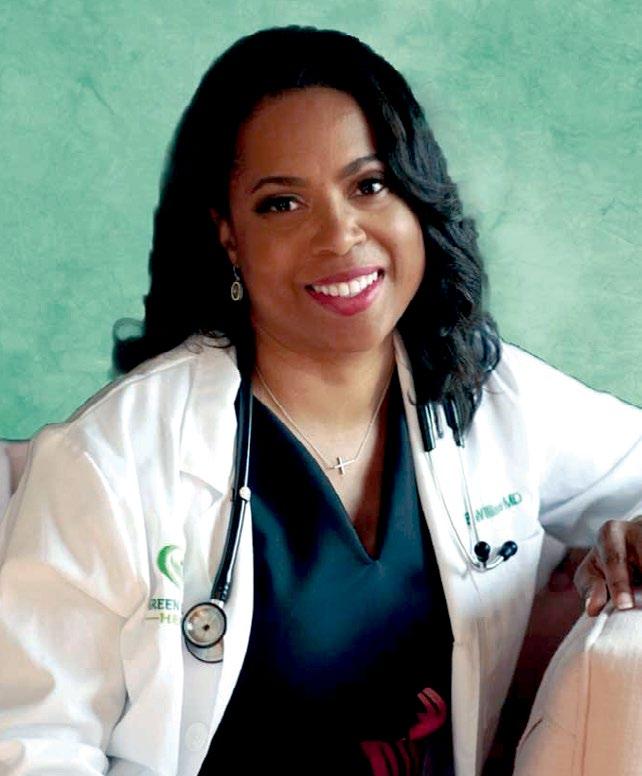
Ohio-based Dr. Bridget Williams is the author of Courage in Cannabis. (Contributed image)
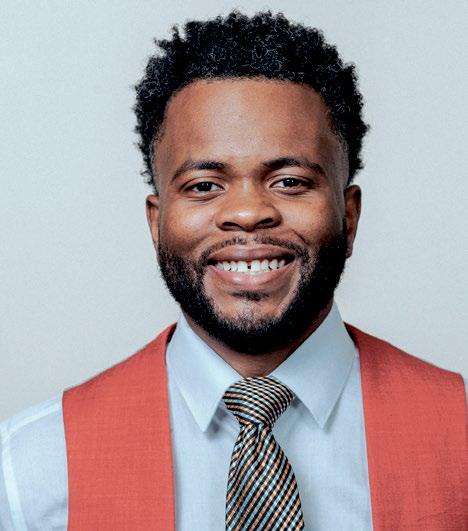
Jamaican-born Kevin Greene, Chief Operating Officer of the Cleveland School of Cannabis, (CSC). (Contributed image)
(CONTINUED FROM PAGE 6)
Cummings clapped back: “If he were close to me, he would get a Chris Rock special.”
Some laughter and applause erupted but Speaker Rochelle Forde banged her gavel.
“Because he is that foolish. He is that foolish,” Cummings added.
But Stephenson maintained that Cummings was overseas.
Cummings spent about a year in Trinidad where he had gone for medical attention for a back injury, he said he suffered in Parliament when he and other opposition lawmakers were thrown out of the House of Assembly chamber in March 2011.
The MP was prevented from leaving Trinidad after the country closed its borders in response to the COVID-19 pandemic.
However, if Cummings was referring to a slap, it appeared that Stephenson, a lay preacher, would not have turned the other cheek.
“Try that outside,” the minister said. “Try that outside.”
The speaker banged her gavel and urged members to “observe proper parliamentary language.”
“Thank you, Madam Speaker,” Cummings said after the Speaker urged him to continue with the debate.
“Try that outside,” Stephenson said again.
Y
Five Ways to Avoid Health Scams
People spend billions each year on remedies they hope will improve their health. But a lot of that money goes to companies making fake claims that cheat people out of their money, time, and even their health. Before you buy a supplement or another health product:
• Always talk with a healthcare provider first. Even if a supplement claims to be FDA cleared or approved, it can interact with your prescriptions, making them less effective or too strong. Work with your healthcare provider to safely incorporate supplements into your treatment plan.
• Don’t stop taking your prescriptions without asking your healthcare
provider. Your provider knows your health history and the right treatments for your condition. • Do some research. Search for the name of the supplement or product online, plus the words “review,” “complaint,” or “scam.” If any product guarantees miracle results, it may be a scam. • Avoid products with “guarantees.” Strangers don’t know how your body will respond. • “Natural” doesn’t mean either safe or effective. In fact, “natural” can mean both harmful and ineffective. And some “natural” products might interfere with proven treatments recommended by your healthcare professional.
